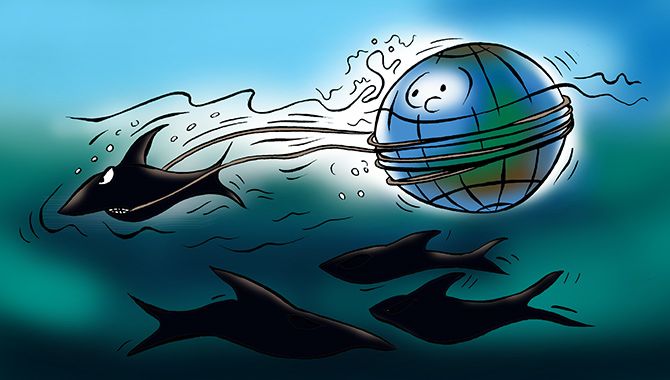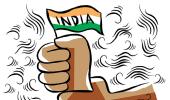'Politicians try to be the leader fish, pulling the country along -- except that they try to knock other aspiring leaders off their course as they go, says Mitali Saran.
Illustration: Uttam Ghosh/Rediff.com

Have you seen those wildlife video clips of large schools of fish, or swarms of birds?
They curl and unfurl through the seas and skies in incredibly complex, fluid patterns, like swirls of smoke.
It's dead cool, and it makes your brain pain.
Hundreds or millions of individuals race in the same direction together, then suddenly one of them turns seemingly on a dime, and suddenly the whole lot is racing in the opposite direction, rinse, and repeat.
How are the seas not thick with concussed herring, how is the earth not carpeted with the twitching bodies of starlings stunned out of the sky by a sharp turn?
It turns out that they manage not to crash into each other because each individual keeps a sharp eye only on its immediate neighbours, maintaining orientation and distance only from them.
But how does the collective figure out where it's going?
Who decides direction, and why do the rest follow?
According to National Geographic, 'The direction an informed individual decides to take lies in a balance between two influences: The desire to achieve a goal such as reaching a known food source, and the interaction with the animals around them.'
It turns out, too, that the majority rules; those who stay with the group have a greater chance of survival than those who hoe their own lonely row.
So when everyone is turning, they turn, even if they'd rather get a tattoo and travel the world on their own.
Dear fellow countrymen, does any of this sound horribly familiar?
I think of this kind of footage when I watch a press conference or a rally speech, in which politicians try to be the leader fish, controlling the direction of the narrative and pulling the country along -- except that they try to knock other aspiring leaders off their course as they go.
I think of this footage every day while reading the newspapers, as the media travels from one story to another, like a school of fish imploding towards one leader holding a crumb, then exploding towards the next -- if you can imagine each fish as pathologically competitive and administering a little slap to each of its neighbours as it passes.
I think of this footage when I encounter a hashtag like #TalkToAMuslim, which is a very good example of a how a swarm can submit to the control of a leader by allowing itself to become mired in a debate as demented and obviously diversionary as 'Is the Congress a Muslim party?'
And I could think only of this footage as I watched the aftermath of The Hug And Wink, or, as the prime minister might call it while briefly smiling, THAW.
Here we are, a bunch of adults with big bumps on our heads from all the horror and nonsense perpetrated on this country by the NDA government, listening to an election year no-confidence motion debate in Parliament featuring the ills and misdemeanours exploiting our most vulnerable citizens, and here are our best media persons, parsing whether The Wink added to, or subtracted from, The Hug.
It's at times like this that I would gladly swap the incredibly complex, fluid patterns of the swarm for one great blundering, thrashing, knock-out mess.
Maybe, after that, everyone could come to their senses.
The point, of course, is that, hello, we are not fish. We can choose to stop darting around obediently gnawing at every bit of bait thrown our way.
I mean, if you heard someone arguing that 'You can hear purple become a triangle, and that's why time is tasty', would you join the argument, or file the scene under 'barking mad' and go about your day?
Global swarming is real, and it's killing us.












 © 2025
© 2025